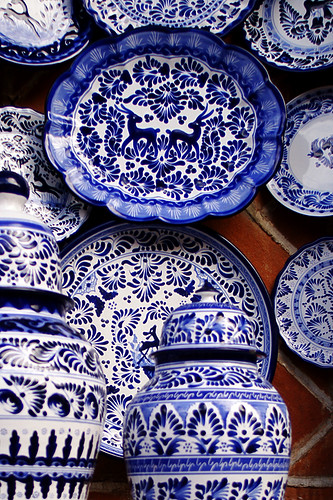Taking just a little advantage and getting on the global wave of the Southafrican World Cup, I'm cheering all the way for Mexico and with all of my heart I hope we can make it to the late and last stages of the cup. :) So, since we're facing tomorrow one of our most challenging matches, I wanted to include some of my favorite Mexican crafts and write about what I know about these crafts. Ultimately, what I know is so little, but my whole life will be dedicated (promise) to getting to know all the little towns and artisan styles of my country. Which, personally, I found myself to be a little concerned on the usage of the word "artisan" which by definition means someone that makes artsy stuff that useful, because art is supposed to be "useless"(that is why ARTISTS are called like that, because they know their technique and do pretty stuff that is useless) but oh well, for me, the people behind all these crafts are masters of their own ways, and its a little sad that only foreigners respect and admire this kind of art (Mexicans are not so fond of artisanry, that's whats sad). But not me. I am one of its biggest fans. :)

Barro Negro (Black Clay). This art is original from the southwestern region of Mexico: Oaxaca, one of the fullest and most vibrant regions in my country. Unluckily I've never been there, but hopefully I will soon. :) This clay is special because it is worked -as any clay is- when it is still wet and moldy, and it gets that special shine when worked and polished.
Talavera Poblana (Pueblan Talavera): Puebla is a central region in Mexico, known internationally by its cuisine (the famous "mole poblano", a dark sauce made out of chocolate and chilis cooked to acocompany white meat such as chicken) and by this special craftsmanship of ceramic called "Talavera". Most of the classic designs of Talavera are hand-drawn over white ceramic, and the traditional color is blue over white. Lovely combination on a monochrome house this would make, huh? :)
Árbol de la Vida (Tree of Life) : As far as I am enchanted with the colors, mise en place and various materials craftsmen use to create these "Trees of Life" I have many doubts on its origins. Some people say they're originally from Michoacan, other people say they're from Oaxaca. The only thing I know is that someday I will have a veeery big one on my entrance hall at home. :) The special thing about these trees is that they supposedly should portray all aspects of life: The heavenly, the earthly and the infernal, because well, that is life, after all.
Calacas, calaveras, calaquitas, catrinas: (Skulls). Without a doubt, the calacas are my most favorite Mexican craft. Whether they're made of clay, or papièr maché or drawn, the Mexican impersonation of death draws my attention the most. Many people have asked me what is it that I like about all of my calacas (I buy a calaca from every place in Mexico I visit, I have nearly 15 by now), but I don't know what to answer. Maybe, it's because I found calacas to be mocking death, or maybe it's just that death is something so common that I am fascinated of the characerization of death, its apparent lux and pleasure, I don't know. I love the boney bodies and faces. This tradition of antropomorphing death was originated in Aguascalientes, by the illustrator José Guadalupe Posadas. This year I HAVE to visit the museum in Aguascalientes (it's only 3 hours away from my house).
Here you go. Hope you enjoyed my short reccopilation of the Mexican crafts I love the most. :)










A couple of photo links were not working but what is visible is beautiful. I especially like the Jaguar head.
ReplyDelete